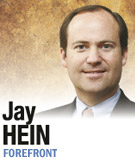Subscriber Benefit
As a subscriber you can listen to articles at work, in the car, or while you work out. Subscribe Now
 Wayne Seybold is well-known as an Olympic ice skater. He is also earning a reputation as an innovative two-term mayor of his hometown of Marion. But few Hoosiers are aware of his role as global trade warrior.
Wayne Seybold is well-known as an Olympic ice skater. He is also earning a reputation as an innovative two-term mayor of his hometown of Marion. But few Hoosiers are aware of his role as global trade warrior.
Nonetheless, just this past summer, Gov. Mitch Daniels stood alongside Chinese business executives to announce the import of 100 jobs to Marion. Y.K. Furniture was one of the companies Daniels and Seybold visited on their September 2009 trade mission to China. Ten months later, the upholstered furniture manufacturer named Marion its U.S. headquarters, with planned investment of $24.3 million.
At the press conference, Seybold said, “We like to cry about how our jobs are going over there, and it’s really nice to see jobs from there coming here.” The “there” Seybold referred to is Zhejiang Province, which boasts the largest provincial economy in China ($309 billion). Just south of Shanghai along the East China Sea coast, Zhejiang also happens to be Indiana’s sister-state established by former Gov. Robert Orr, who blazed the Hoosier state’s economic development trail in Asia in the 1980s.
State leaders sought trade in the 1980s and exports in the 1990s. Now the Daniels administration is focused on foreign direct investment such as the Y.K. Furniture deal, expanding exports such as agricultural products as well as outflow investments.
Consider the case of Eli Lilly and Co. With 92 million Chinese diabetics and another 150 million at risk for the disease, the company has invested $293 million in the country since the late 1990s. The payoff is annual sales in excess of $270 million.
With China’s 1.3 billion potential customers, Indiana is in line with the rest of the Western business world in seeking to do business there. Of course, all these deals happen one at a time and the Chinese business culture prizes relationships over PowerPoint presentations.
With the advantage gained by frequent flier miles and handshakes, mayors from Muncie, Logansport, Monticello, Kokomo, Portland and Marion traveled with Daniels in November.
“Meeting Gov. Daniels in China last fall played a big part in considering Indiana,” said Jin Jianguo, owner of Y.K. Furniture. He elaborated that Seybold’s sincerity and Marion’s “optimal location” made the city’s vacant Hobby Lobby store an ideal venue for their Chinese business hub. Such retail sales push Hoosiers ahead of other states.
However, a question remains: How much of Indiana is ready for such a globalized marketplace? It was not quite five years ago that Daniels announced one of the state’s all-time greatest deals: transforming a cash-losing toll road in northern Indiana into a $4 billion windfall. Opposite the spontaneous cheers during Daniels’ initial press conference, the general public quickly turned skeptical amid fears that the foreign lease purchaser (a Spanish-Australian consortium, notably longtime allies) would somehow imperil our security.
Whereas the toll road lease offered a square-jawed nationalism-versus-globalism debate, apprehensions about China are rooted in deeper soil. For example, lingering concerns over human rights signal China’s economic reforms outpace its political reforms. Yet, as Gov. Orr would often remark, the best way to promote peace is to do business with one another.
Expert China observers explain that the country has turned the page on its Cultural Revolution and is now in rapid modernization mode. The Great Leap Forward, as the Chinese describe it, may be more a byproduct of demographics than anything else. In his memoirs, President George W. Bush recalls asking Chinese President Hu Jintao what keeps him up at night. His response: creating 25 million jobs each year.
Such pragmatism is at work in towns across Indiana, as well. Against the backdrop of shuttered factories and laid-off workers, enterprising mayors have become among the state’s most important economic development officials. Author Richard Longworth made a splash by criticizing the sluggish Midwest for being globalization’s biggest losers. Indiana’s globally minded mayors are disturbing Longworth’s critique and paving the way to prosperity.•
____________
Hein is president of Sagamore Institute, an Indianapolis-based think tank, and was an official in the administration of George W. Bush. Send comments on this column to [email protected].
Please enable JavaScript to view this content.
